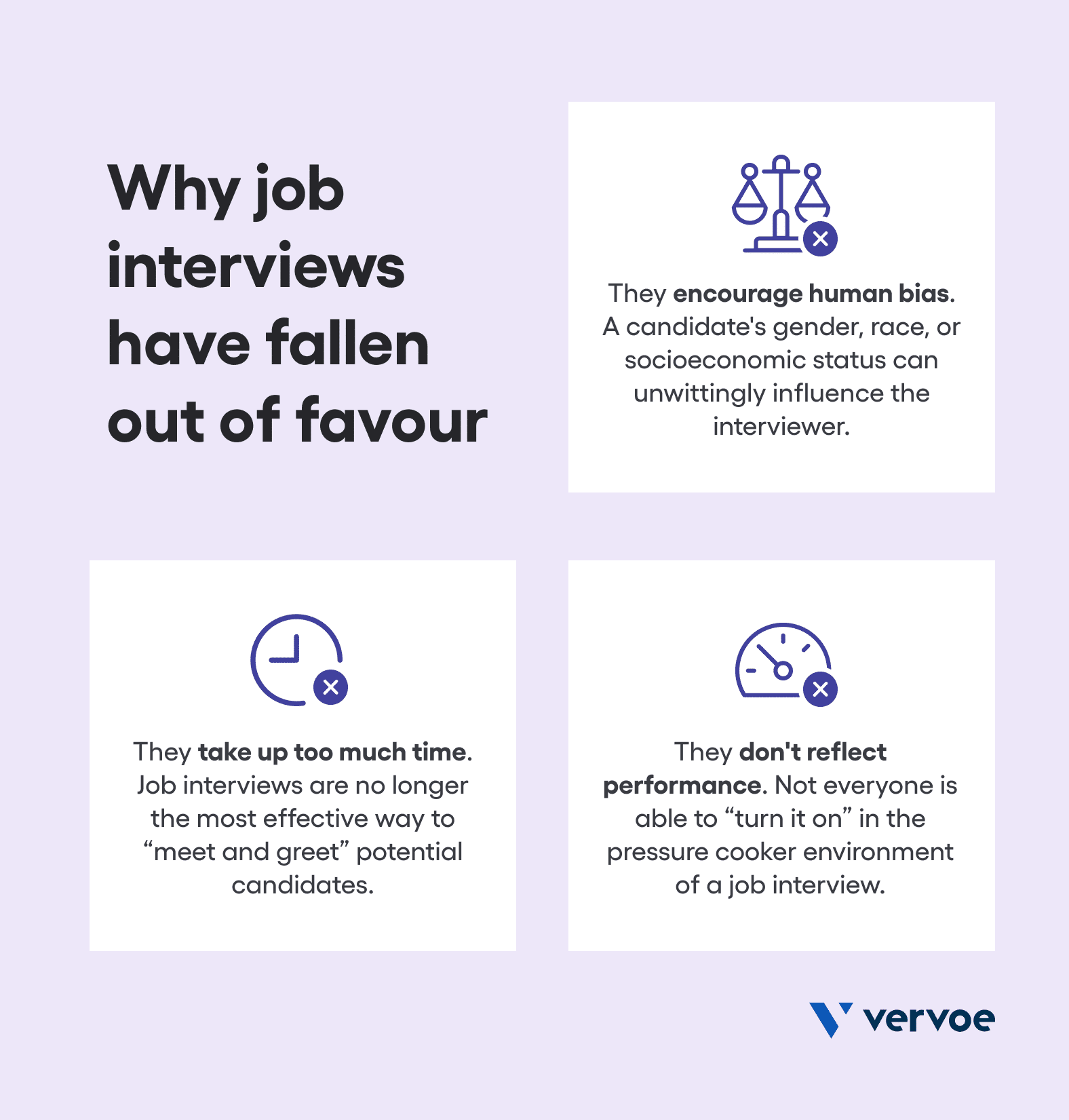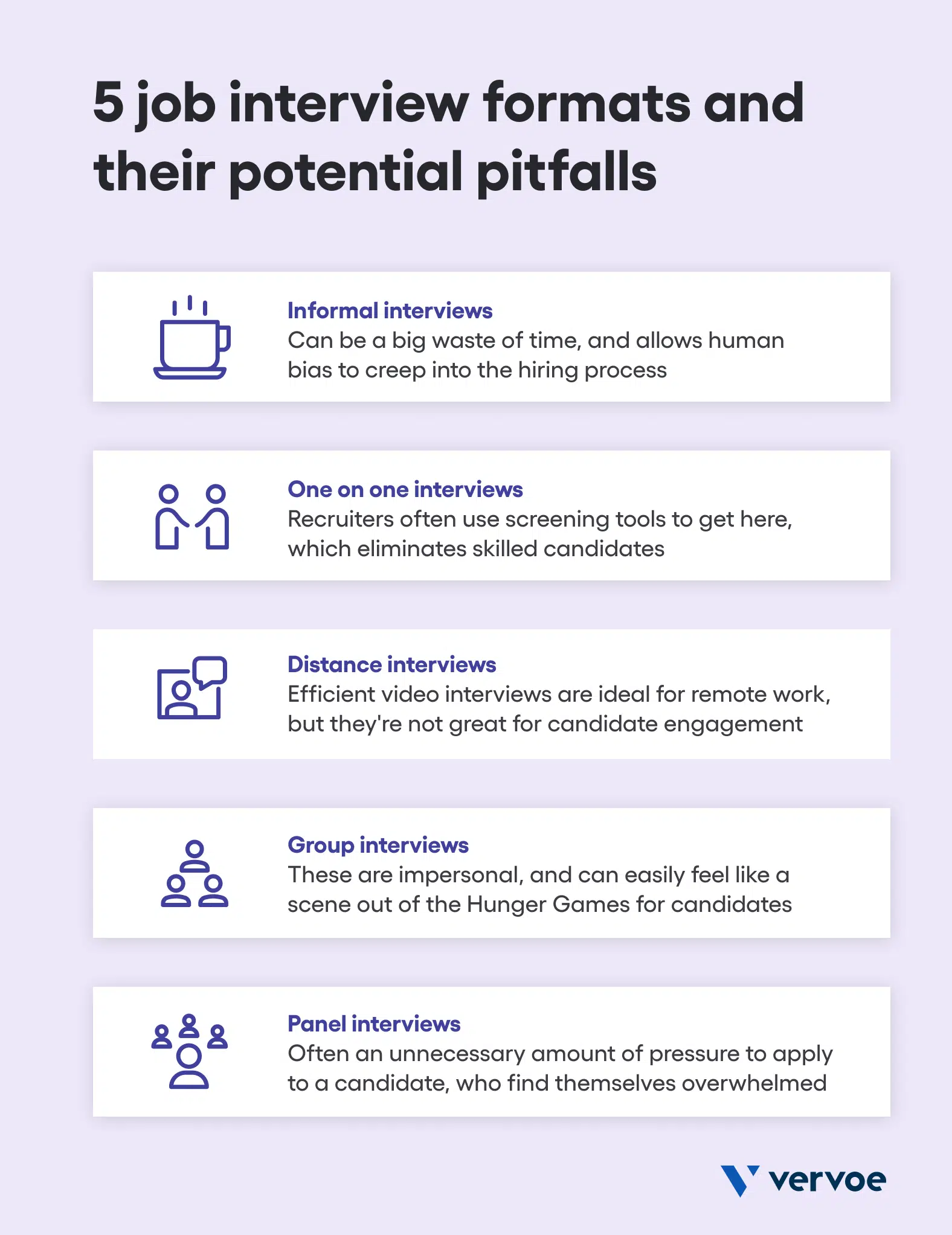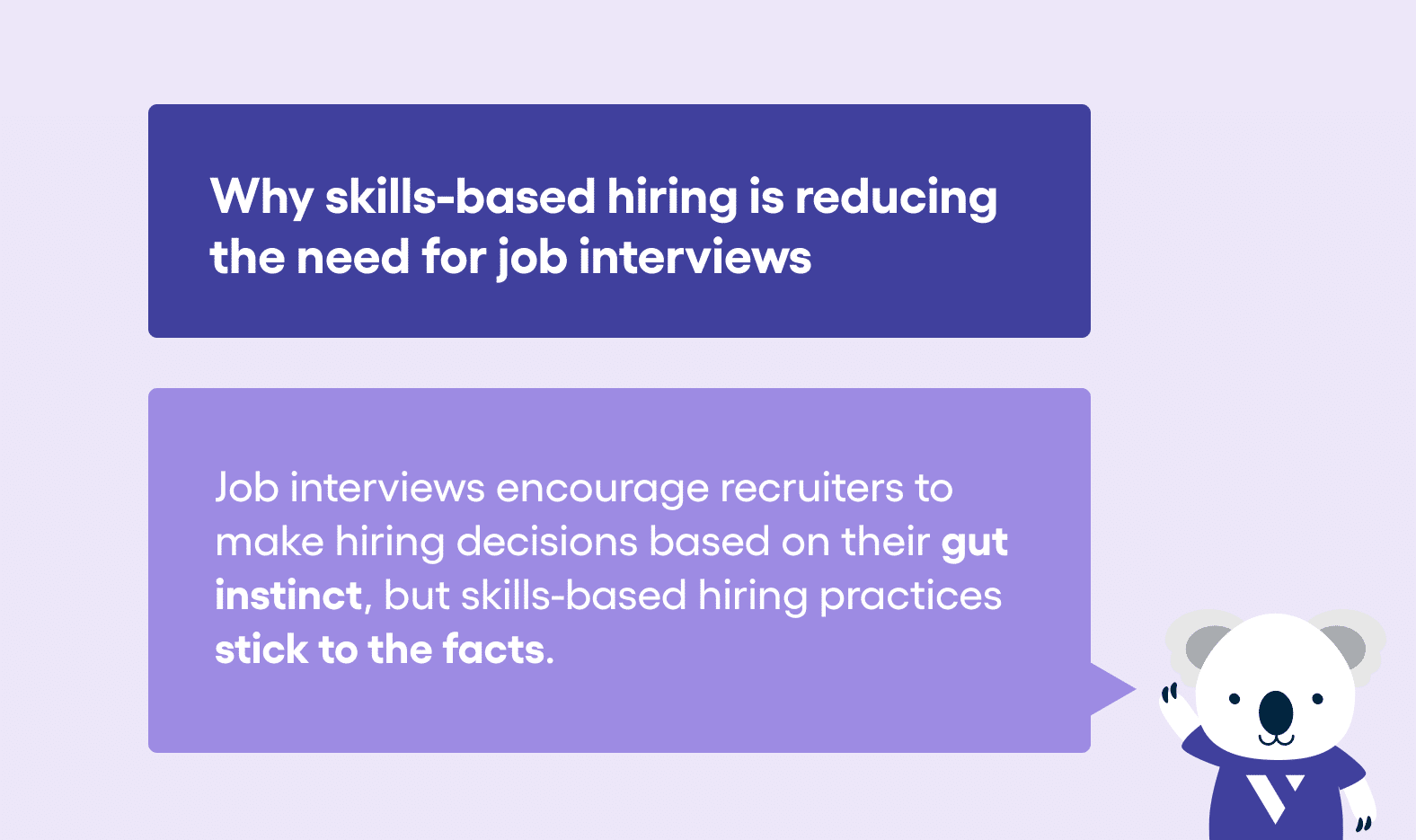Many recruiters believe that job interviews are an integral part of the hiring process, but what if job simulations presented a more data driven alternative?
Our ability to judge someone’s character, personality, or skill level by a short conversation is poor, and yet job interviews are still one of the most dominant tactics used by recruiters during the hiring process – but why exactly is that?
An urban myth about onsite interviews is that it gives hiring managers an opportunity to find out all the things that aren’t on a resume. While unearthing hidden skills and personality traits is important, the danger of job interviews is that the cons can quickly outweigh the pros.
Why onsite interviews have fallen out of favor
According to research conducted by the University of California, our ability to predict success from a typical job interview is roughly the same as flipping a coin.
While there’s decades of research into the effectiveness of job interviews – or lack thereof – the only consistency from job interviews is their inconsistency.
Thankfully, the arrival of the global pandemic forced us to rethink how we approach this recruitment method, and has highlighted some of the key reasons why both recruiters and candidates alike have fallen out of love with onsite interviews.
Job interviews encourage human bias
Job interviews can be subjective, and biases may creep into the process. As an example, interviewers may have implicit biases based on the candidate’s gender, race, or socioeconomic status, which can impact hiring decisions and discourage fair recruitment strategies that encourage workplace diversity.
In fact, research shows that 25.5% of hiring decisions are made within the first 5 minutes. Although most people strive to be objective, this data reflects that some recruiters are often forced to make quick decisions, and naturally, these are often influenced by “gut feelings”, first impressions, and opinions – not facts.
Onsite interviews are too time-consuming
Job interviews can be time-consuming for both the interviewer and the candidate, and are no longer the most effective way to “meet and greet” potential candidates. For interviewers, conducting multiple rounds of interviews and coordinating with multiple candidates can be a significant time commitment.
For candidates, preparing for interviews, traveling to the onsite interview location, and taking time off work can be a big investment for something that may not pay off. Therefore, it should come as no surprise that video interviews are rapidly replacing onsite interviews, especially with the rise of remote workplaces.
Job interviews don’t reflect performance
Not everyone is able to “turn it on” in the pressure cooker environment of a job interview, and this can negatively reflect on applicants who may not identify as being outgoing or exude self-confidence. However, it’s important to keep in mind that these qualities don’t actually reflect how they might perform on the job.
Nervousness, stress, or a lack of experience with interviewing can all negatively impact a candidate’s performance. Instead of grading them based on their conversational skills, a growing number of recruiters are turning towards alternative methods to assess their actual skills and abilities.

5 types of job interviews and their potential pitfalls
It’s important to keep in mind that job interviews aren’t inherently bad. While research collected by Forbes suggests that 60% of recruiters now use video technology instead of onsite interviews, factors like industry, skill level, and position will influence which interview approach is appropriate – if any.
While technology might be streamlining the recruitment process, it’s rare to place a candidate in a role without conducting at least one form of interview.
It might be many years before we see job interviews eliminated entirely, but for now, these are the most common formats and the relevant dangers to watch out for.
Informal interviews
Often conducted at the early stages of the recruitment process, an informal interview is often conducted via a telephone call. Many recruiters use this method under the guise of “having a chat”, but it’s often an easy way to get clarity on something in a candidate’s application.
Risks of informal interviews
At face value, conducting a five to ten-minute informal interview might seem efficient, but hiring managers should take note that this is where the potential for human bias creeps in. If you have a question about an application and want to reduce the odds of getting off track, why not simply email the candidate instead?
One-on-one interviews
A one-on-one job interview is a format that most candidates and recruiters alike are familiar with. Traditionally, they are available in two forms: a structured interview or an unstructured interview. Although this can also apply to panel interviews, either of these formats are common in one-on-ones.
Risks of one-on-one interviews
Almost every successful job applicant will encounter a one-on-one interview, but the point at which this happens during the recruitment process can vary. Some recruiters use resume screening tools to narrow their interview list, but this has the potential to overlook skilled candidates without the right backgrounds or degrees.
Distance interviews
A distance interview is one where candidates may be asked to meet on the phone or over video with a hiring manager – think of them as an online job interview. Once, this method was used as a prescreening tool to ask candidates basic questions, before asking them to come into a physical office to conduct an onsite interview.
Risks of distance interviews
Today, distance interviews are much more common thanks to the rise of remote workplaces. Now, traditional one-on-one interviews have largely been replaced with video conferencing tools, as this saves time and resources for both parties involved. The downside? They’re not great for human connection.
Group interviews
As the name would suggest, a group interview is a technique in which several candidates are interviewed simultaneously for similar positions. To be successful, group interviews must be well planned and executed, and are often used by employers that need to find a large number of employees quickly.
Risks of group interviews
So are group interviews effective? By their very nature, group interviews are impersonal and can easily feel like a scene out of the Hunger Games for the candidates forced to participate. While they may be suitable for roles that demand strong people skills, one-on-one interviews are still considered to be more effective.
Panel interviews
A panel interview can be conducted either in person or via video through a distance interview. Panel interviews involve multiple stakeholders interviewing a potential candidate, and are particularly common for management or leadership positions, or roles that require liaising with multiple departments.
Risks of panel interviews
With people coming from such different perspectives within an organization, the experience can quickly become overwhelming for candidates. One panel may have staff from human resources, potential managers, and even other employees, but this may be an unnecessary amount of pressure to apply to a candidate, and impact their performance.
Notable mentions: structured and unstructured interviews
A structured interview relies on a set of standardized and premeditated questions in order to gather information. In contrast, an unstructured interview does not rely on a set of premeditated questions in its data-gathering process, with the latter leaving more room for potential human bias.
Risks of unstructured interviews
All job interview formats have the opportunity for structured or unstructured approaches. Keep in mind that structured interviews limit the odds of “going off script” thanks to the clear guidelines, so are great for limiting the potential for bias when screening large pools of candidates when compared to unstructured interviews.

Why skills-based hiring is reducing the need for job interviews
In a typical hiring process, screening tools and tactics look for keywords on an application to verify if the candidate is suitable for the role. In theory, these screening practices seek to ensure the candidate is the “right fit”, using an applicant’s education or degree as a proxy for talent.
Unfortunately, taking this approach to hiring can be misleading for a variety of reasons, and set both the hiring manager and the candidate up for failure.
Firstly, resumes are unreliable at best, since many candidates may inflate their experience or outright lie. Secondly, a degree doesn’t necessarily tell you if a candidate is capable of performing well, as their qualifications may not reflect their actual abilities.
To further compound the issue, job interviews fundamentally fail to measure whether a candidate would be a good fit at an organization or not. A conversation is not enough to measure someone’s abilities, let alone validate them.
Enter, a data-driven alternative: skills-based hiring. If you’re unfamiliar with the philosophy, skills-based hiring is the practice of screening and hiring new employees based on the skills, capabilities, and talent they bring to the table — as opposed to their educational background or degree.
Ultimately, skills-based hiring levels the playing field for all candidates. More so than resumes or job interviews, a skills test can assess the true potential of a new hire to go the distance with the company while giving all applicants an equal opportunity to showcase their talents – but how should recruiters use them in the place of outdated recruitment tools like job interviews and resume screening?

How job simulations can streamline your interview candidate list
Skills-based hiring is rapidly gaining popularity in recruitment for its ability to eliminate human bias, reduce attrition, identify top talent, and ultimately help recruiters to hire with confidence. While these are benefits that almost any hiring manager would happily sign up for, how should skills-based hiring be introduced in practical terms?
Skills assessments and job simulations are considered to be the easiest way to practice skills-based hiring. By answering a series of questions in different formats, candidates are able to show how they would approach the role.
Tasks in a skills assessment can be immersive, such as a coding challenge or job simulation, or instead target soft skills, such as motivation, communication, and emotional intelligence. Whatever a certain role commands, skills-based hiring can use role-specific assessments customized to reflect the relevant metrics of success.
The great thing about skills assessments is that they can be used at any stage of the hiring funnel to streamline a list of candidates suitable for job interviews.
As they’re adaptable to job-specific performance metrics, skills assessments can be used in short formats at the early stages of a recruitment drive, or get into the nitty gritty if you’re stuck on two or three final contenders.
In an ideal world, skills assessments and job simulations will eventually replace job interviews entirely. Making hiring decisions based on data instead of guesswork or intuition is not only a smarter way to hire with confidence – it’s the future of recruitment.
Talent stands out with job simulations
Vervoe is an end-to-end AI-powered solution that is proudly revolutionizing the hiring process through skills testing, job simulations, and machine learning.
By empowering businesses to create assessments designed to suit the specific requirements of a role, Vervoe predicts performance that showcases the talent of every candidate.
By assessing an applicant’s ability to perform the role through a skills assessment, our job simulations focus on the work — and not the person. To see people do the job before they get the job, book a demo today and let our experienced team run you through Vervoe’s full range of hiring solutions.


















